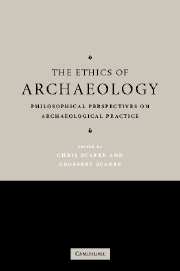Book contents
- Frontmatter
- Contents
- List of contributors
- Acknowledgements
- 1 Introduction
- PART I THE OWNERSHIP OF CULTURAL OBJECTS
- PART II ARCHAEOLOGISTS AND THE LIVING
- PART III ARCHAEOLOGISTS AND THE DEAD
- 11 Can archaeology harm the dead?
- 12 Archaeological ethics and the people of the past
- PART IV THE COMMON HERITAGE OF HUMANKIND?
- References
- Index
12 - Archaeological ethics and the people of the past
Published online by Cambridge University Press: 05 June 2012
- Frontmatter
- Contents
- List of contributors
- Acknowledgements
- 1 Introduction
- PART I THE OWNERSHIP OF CULTURAL OBJECTS
- PART II ARCHAEOLOGISTS AND THE LIVING
- PART III ARCHAEOLOGISTS AND THE DEAD
- 11 Can archaeology harm the dead?
- 12 Archaeological ethics and the people of the past
- PART IV THE COMMON HERITAGE OF HUMANKIND?
- References
- Index
Summary
That archaeological practitioners have ethical responsibilities to various present-day groups is almost universally recognised, even if there is some disagreement about the exact nature of those responsibilities, and over how competing claims can be negotiated. Much archaeological legislation, and most codes of practice, also recognise a responsibility to future generations, at least implicitly, in their defence of preservation, conservation and recording. However, the ethical relationship between modern archaeologists and the past people whom they study, and whom in one sense at least they represent, has hardly been considered.
How do, and how should, archaeologists relate to the people they study? There is certainly no agreement on the issue. While it is possible to construct a coherent case arguing that all our ethical responsibilities relate to the present and future, and that the past is a ‘resource’ to be deployed in line with political aims in the present, others, including myself, have argued that we owe a responsibility towards past people at least as far as concerns the ways we represent them, if not a duty of advocacy. This chapter will contend that ethics are ideological and culturally situated, rather than transcendent and universal, and that because of the pervasiveness of Western, scientific and medical beliefs about bodies, selves, life and death, modern archaeologists' attitudes towards past people may not be coherent and raise problems for our practice.
- Type
- Chapter
- Information
- The Ethics of ArchaeologyPhilosophical Perspectives on Archaeological Practice, pp. 199 - 216Publisher: Cambridge University PressPrint publication year: 2006
- 24
- Cited by

